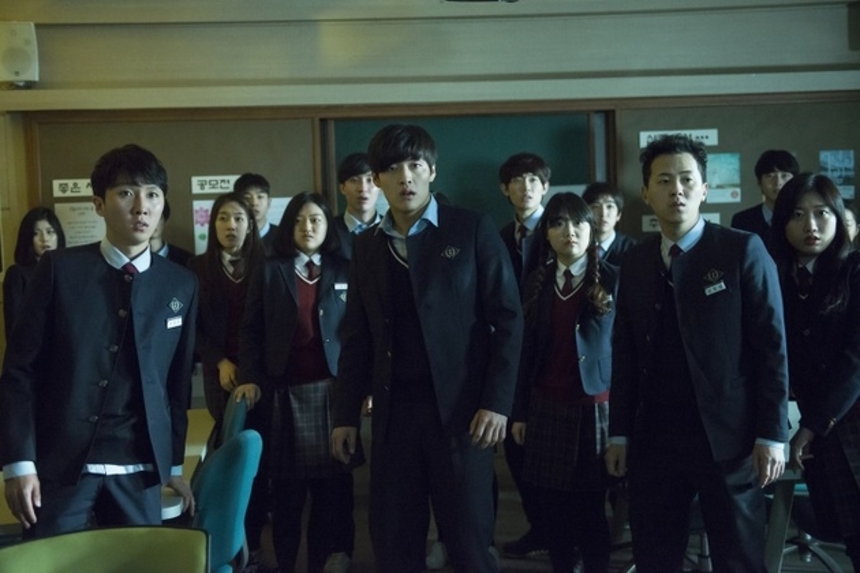PiFan 2014 Review: Horror Comedy MOURNING GRAVE Aims Low But Hits Its Mark

Korean horror has been in the midst of a rough streak for the past half decade. Relying on worn out themes, new works been have trotted out regularly every summer but even with lowered expectations, each year has put forth an increasingly lackluster and listless lineup of new films. Trying his best to buck the trend is the experienced short filmmaker Oh In-chun, who steps up to the feature-length plate with his horror-comedy debut Mourning Grave.
In-su has a very special ability. Though he would no sooner be a normal teenager, he has the ability to see the spirits of the departed. After leaving his hometown, where he developed his unwanted ability, In-su is forced to go back and confront his demons. He stays with his uncle, also endowed with the special sight, and attends the local high school, which is terrorized by a band of bullies who lord over their weaker classmates. In-su enters into a cautious friendship with the spirit of a high school girl and shortly after his arrival the school bullies begin to be targeted by a vengeful masked spirit.
As recently as 2011, K-horror still had some interesting ideas (White: Melody of the Curse) and strong production values (Ghastly), even if the films didn't pass muster. But these days the genre is on life support and badly in need of revitalization. While horror is no longer a money-spinner in Korea by itself, it has proven potent and profitable when mixed successfully with other genres. Their horror elements were closer to parody than actual scares, but comedy-horror-melodrama Hello Ghost (2010) and horror rom-com Spellbound (2011) were widely embrace by audiences.
Following the same tack, though more serious in its application of horror elements, Mourning Grave is an unapologetically straightforward high school haunting feature that makes up in laughs what it lacks in originality. Titled simply 'Girl Ghost Story' in Korean, Oh's film both embraces and lampoons the simple trappings of K-horror's staple narrative. Following five Whispering Corridors films and a few dozen other 'girl ghost stories' in modern Korean cinema, Oh is wise to avoid taking an original spin on the well-tread genre. He makes familiarity his ally by, for example, casting actors who mostly look almost a decade older than their characters as cartoonishly obnoxious teens, one of the many instances where the director mines comedy from the sub-genre's well-known conventions.
A graduate of the Korean National University of Arts, Oh has been on some people's radar for the last few years due to his accomplished short films, such as Metamorphoses (2011), which are all deeply rooted in genre cinema. Though I believe we can look forward to bigger and better things from the energetic cineaste, Oh brings plenty of his irreverent dynamism to Mourning Grave. He dials his style down somewhat, offering up a simpler visual palette but he peppers it with his technical knowhow and easy humor.
The fresh-faced Kang Ha-neul and Kim So-eun lead the young cast as the shy In-su and his awkward ghost girl companion. Though called on to play it straight, unlike their more affected co-stars, the pair are easy on the eyes and deftly capable of weaning laughs out of awkward exchanges and surprised reaction shots. Also on hand to offer a welcome dollop of broad comedy is character actor Kim Jung-tae as In-su's uncle.
Mourning Grave is a smooth ride from start to finish, boasting a smatter of good laughs though failing to offer any real scares. The bar is admittedly low but Oh delivers one of the most satisfying recent entries into the K-horror pantheon. However, he is also the latest filmmaker to shy away from doing something original with the genre, and his film exudes a sense of caution. Given the prowess he's demonstrated in his short films, Oh appears to be holding back, careful to deliver something studio friendly on his first big outing. Mourning Grave may harbor modest ambitions but given the current state of K-horrors, it's refreshing to see one that meets expectations.







